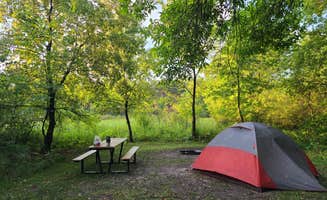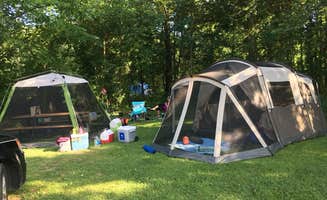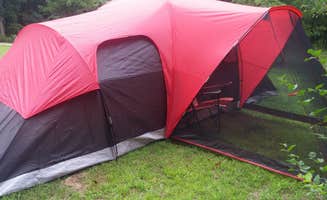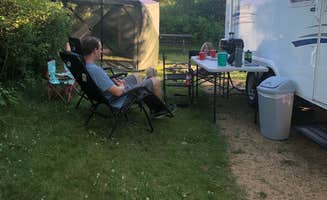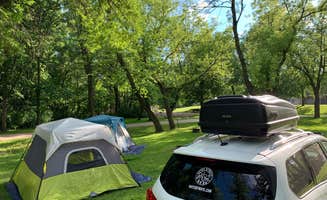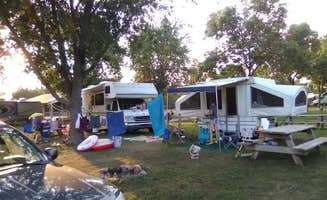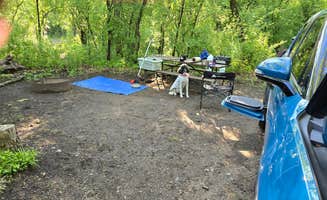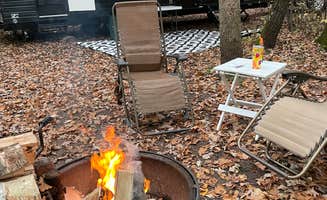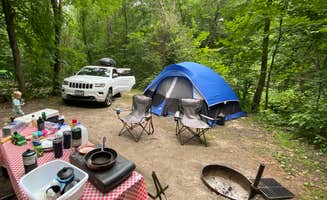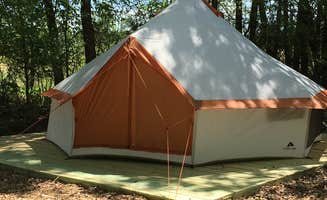Northern camping options around Lino Lakes remain accessible year-round, with winter camping available at William O'Brien State Park, complete with heated cabins. The terrain features rolling hills, woodland areas, and prairie landscapes offering elevation changes from 800 to 950 feet. Temperatures range from summer highs in the mid-80s to winter lows below freezing, creating distinct seasonal camping experiences across the region's public and private campgrounds.
What to do
Hike diverse terrain: Rice Creek Campgrounds offers multiple trail systems through both woodland and prairie settings. "We entered the shower and restrooms to bugs, bugs, BUGS!! Nasty 🤢. Neither of us showered there. Walked back to set up our tent, horseflies nonstop attacked us," reports one summer camper, highlighting the importance of bug protection during peak season.
Explore glacial potholes: At Interstate State Park, visitors can experience unique geological formations. "The draw here is the world's largest glacial potholes. When the river ran 200' higher than it does today, tornados of water eroded smooth round, massive holes in the rock. Some are so big that they still to this day have no idea how deep they go," explains one visitor who hiked the pothole trails.
Try multiple water activities: The filtered swimming pond at Lake Elmo County Park Reserve offers a unique swimming experience. "They have a home made lake that has a sand bottom but it has chlorine like a pool so no weeds. Great for swimming," notes a visitor who appreciated this unusual amenity that combines natural setting with pool-like cleanliness.
What campers like
Privacy between sites: Campers consistently mention site spacing at Bunker Hills Regional Park. "The lower loops are definitely better for tent campers, even though quite a few spots could support an RV. The campground map does a good job of providing visual indicators of what a site provides," states one reviewer who found the campground reminiscent of state parks despite being in the suburbs.
Overnight proximity to Minneapolis: Many campers value the quick access to urban areas. "I booked this on a whim since we needed an overnight close to the State Fair. I loved the look of the 'TENT ONLY' loop - you don't see this often," explains a Rice Creek Campgrounds visitor who appreciated the tent-specific camping area and absence of generators.
Wildlife viewing opportunities: Early morning and dusk offer prime wildlife viewing. "We even saw a turtle laying eggs in a different campsite," shares a William O'Brien State Park visitor who camped in the Savanna Campground area where frogs can be heard throughout the night in season.
What you should know
Season variations: Most campgrounds operate from May through October with limited winter options. "Firewood at $7 a bundle doesn't burn, it just smokes. I asked for a refund. Buy firewood elsewhere," advises a Rice Creek visitor, suggesting campers should consider outside sources for better burning wood.
Reservation systems: William O'Brien State Park requires advance planning, especially for summer weekends. "Weekends have been packed and reservations scarce for months at state parks in Minnesota. Arriving on a Sunday afternoon was a dream—very few people in the campground loop (especially the non-electric ones)," shares a solo camper who found Sunday arrivals ideal for both weekend access and avoiding crowds.
Insect populations: Bug levels vary by season and location. "The mosquitoes were absolutely nuts!" reports a Rice Creek Campgrounds visitor who stayed at drive-in site 77, while another mentioned, "We had our tent, fire and books to read and was the happiest camper in the world," suggesting preparation matters more than bug presence.
Park entrance fees: Daily vehicle permits cost $6-7 at most regional parks, separate from camping fees. "Your reservation fee does NOT include the daily parks fee of 7 dollars just FYI," notes a visitor to Bunker Hills who was surprised by this additional cost.
Tips for camping with families
Water play options: Willow River State Park offers waterfall access for supervised play. "We did SO many miles hiking! And at certain points in the river, you are able to get in and swim! We love camping here!" shares an enthusiastic family who combined hiking with water activities.
Playgrounds and activities: Multiple campgrounds offer child-friendly facilities. "Lake Elmo County Park in Washington County Minnesota is a great park for families. There are a bunch of things to do including hiking, horseback riding, swimming in their filtered pond, boating and an insane playground," reports a visitor who found the facilities ideal for children.
Midweek camping: For quieter family experiences, consider non-weekend stays. "The campground is quiet but not much space or privacy with clean facilities," notes one Interstate State Park visitor, suggesting families consider the tradeoff between weekend energy and midweek tranquility.
Tips from RVers
Site selection guidance: At Bunker Hills Regional Park, "The upper loop (sits 45-64) is definitely more geared towards RVs, so not what I would consider an ideal tent site," explains a visitor who explored both camping areas, noting the clear distinction between tent and RV-appropriate spaces.
Hookup availability: Electrical service varies across campgrounds. "We stayed the last night of their camping season and were able to utilize water and electric hookups," mentions a visitor to Lake Elmo who appreciated the late-season access to utilities during their final night of a cross-country trip.
Accessibility considerations: Some campgrounds offer easier RV access than others. "Close to downtown which was nice for us coming through. Water fill stations readily available so we loaded up prior to continuing out west," notes a visitor at Bunker Hills who found the convenient location and water access perfect for travelers passing through the Twin Cities region.


